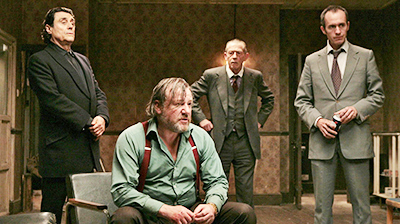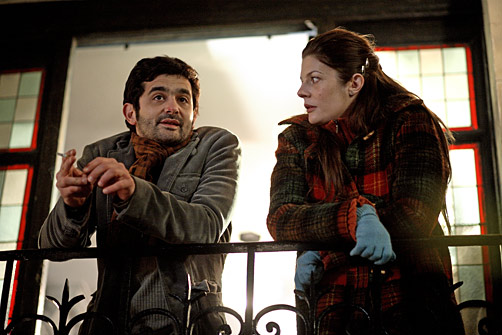
Take one low-rent apartment on the wrong side of London. Add the two most woefully underused actors in Indiana Jones and the Last Crusade. Throw them together with the two most libertine Americans in Paris, circa 1784. Then add a sizable dollop of (Big Gay) Al Swearingen and what do you get? Why, enough bottled-up testosterone to kill a small horse, naturally.
Well, that and Malcolm Venville’s very theatrical-seeming 44 Inch Chest, a play-like disquisition on primal, wounded masculinity-in-early-winter brought to you by Louis Mellis and David Scinto, the writers of Sexy Beast. (In fact, by the transitive property of fandom, I could’ve opened this review instead with 2/3rds of Beast + 2/3rds of Paris, 1784 + a very ornery Winston Smith, most definitely post-Julia, and the math still works out.) Put in brief, this film was aptly summed up by David Edelstein in one sentence: “It starts to feel less like a thriller than an actors’ workshop.” That’s very true, but, ah, what actors they are.
Edelstein is entirely correct that 44 Inch Chest is mostly all dressed up with no place to go. More than anything, this film just tries to convey a mood of wallowing in the wounded male id for 90 minutes, and the movie ultimately has so little to do that it eventually starts adding random, ill-thought-out dream sequences and clips from the 1944 version of Samson & Delilah just to pad the running time. Still, much like The Men Who Stare at Goats, I’m inclined to forgive a movie some serious flaws if I enjoy the company of the actors involved. And, in that sense, I’ll concede to having a better time at 44 Inch Chest than it probably deserved.
The story here is very simple: Colin Diamond (Ray Winstone) is a broken man. His beloved wife of 21 years (Joanne Whalley) has not only fallen out of love with him, but betrayed him with a handsome French waiter (Melvil Poupaud, who took the same situation much more sanguinely in A Christmas Story.) And now he’s a weeping, blubbering, suicidal, homicidal mess. So much so that his four best mates — amiable Archie (Tom Wilkinson), suave Mal (Stephen Dillane), the happily out Meredith (Ian McShane), and the vindictive Old Man Peanut (John Hurt) — decide to take drastic action.
They capture “Loverboy,” throw him in a wardrobe in the aforementioned rundown flat, and wait around for Colin to exact his revenge. And if he won’t “man up” enough to get the dirty deed done, well, somebody else will have to step in to do it. Because, in this day and age, and men being what they are, cuckoldry is a crime against nature that simply cannot go unavenged. As this crew tell us time and time and time again, usually using even more colorful language, “you just don’t f**k another man’s wife.” But, to paraphrase the inimitable Lloyd Dobler, if these guys know so much about women, how come it’s 3am at the London equivalent of the Gas-and-Sip, and there are absolutely no females around?
If this all sounds like a Harold Pintery, foul-mouthed cockney version of those egregiously mook “men under the gun” Superbowl ads we were regaled with last weekend, well, maybe we’re sorta in the same ballpark. But I would qualify that. First off, just as NIN’s Pretty Hate Machine or, say, (500) Days of Summer capture some of this angst on the young-man side, 44 Inch Chest is really less about misogyny as a dubious lifestyle choice and more just about Men of a Certain Age being burned alive in the horrible flames of thwarted love. Put another way, this movie is a pretty exact cinematic equivalent of Tom Waits’ towering “Make it Rain” or Nick Lowe’s “The Beast in Me” — which, as you know if you have one, is “restless by day, and by night, rants and rages at the stars…(God help the Beast in Me.)”
And speaking of the Beasts in Us, the Sexy Beast influence is pretty strongly felt throughout this movie, and not just because Winstone, McShane, and countless iterations of the C-word are back. Most obviously, John Hurt is now in the over-the-top Ben Kingsley role (also appropriated by Ralph Fiennes in In Bruges), and he has a good deal of fun with it. But other elements of Sexy Beast also came to mind throughout Chest — the dream sequences (better executed in Beast), the men-writhing-underwater bank heist (surely a good visual metaphor for the delving into the male id here), and, maybe most notably, Gal’s memorable profession of love over the phone from London: “I love you like a rose loves rainwater, like a leopard loves its partner in the jungle, like…I don’t know what like.” (And, come to think of it, Sexy Beast has a cuckolding subplot too, with Aitch, Don, and Jackie.)
To be clear, Sexy Beast is, by all accounts, a much better and more interesting film. (It made #29 on my Decade top 100.) But, even though this movie doesn’t really work on its own, I enjoyed 44-Inch Chest as sort of an extended, actors-studio riffing on the same themes. For all the posturing machismo in both movies, Chest and Beast are really both about closet romantics bottling up their feelings behind a tough guy veneer, and the awful consequences that arise when those feelings finally, irrevocably spill out. (In addition, both films feature crimes of passion, and here Winstone is even more tortured by his horrible deed as he is his initial predicament.) To put it another way, 44-Inch Chest is Sexy Beast with its leg caught in a coyote trap, gibbering and howling into the wind in primal misery.
Now, if you haven’t seen Sexy Beast, and don’t much feel like dwelling at length about the similarities, I’ll leave it at this: 44 Inch Chest is basically a filmed play about manliness-gone-sour that’s far too meandering after awhile, and it completely loses the thread in its last half-hour. Still, to my mind, there are worse ways to pass the time than seeing Ray Winstone sweat out several choice monologues, a snarling John Hurt getting to chew the scenery for once, Ian McShane deadpanning a few choice quips, and Stephen Dillane stealing several scenes just by his very presence. (Wilkinson, for his part, should’ve been given more to do.)
This, by the way, is the same trick Dillane often pulled on poor Paul Giamatti in John Adams. Give Mr. Jefferson his due — he might just be operating at a Tony Leung threshold of cool right now. The guy needs more parts and stat…and he’d make a great Doctor when Matt Smith retires the police box…



